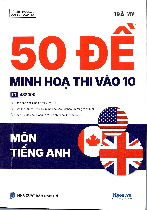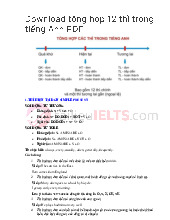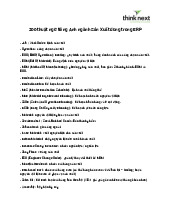




Preview text:
lOMoAR cPSD| 47882337 Unit 1: Phrases 1. Noun phrases
Exercise 1. From each of the following sets of data, form one phrase composed entirely of premodifiers + head word:
1 stamps for insurance, several thousand, unused, stolen recently
several thousand recently-stolen unused insurance stamps
2 all these shells, walnut shells, shrivelled, broken
all these broken, shrivelled walnut shells
3 a famous school, teaching medicine, in Scotland
a famous Scottish medical school
4 the cultivator that sells best in the country
the country’s best selling cultivator
5 a cottage in the country, very picturesque though crumbling slightly; roof of thatch.
A very picturesque, slightly crumbing thatch-roofed country cottage
Exercise 2. Change the form of the phrase below so that the postmodifiers become premodifiers:
1. A house that has been built well. well-built (house)
2. The article which was mentioned above. above-mentioned (article)
3. An improvement that is needed badly. badly-needed (improvement)
4. A secret that has been kept closely. closely-kept (secret)
5. Wealth that has never been told. untold (wealth)
6. Cruelty such as we have never heard of before. unheard of cruelty 7. Central heating fired by oil. oil-fired 8. Girls with blue eyes. blue-eyed girls 9. A man with a red nose. lOMoAR cPSD| 47882337 red-nosed man
10.A censor with a heavy hand. heavy-handed (censor)
11.A tiger with teeth like sabres. sabre-tooth (tiger) 12.A boat with a flat bottom. A flat-bottomed boat 2. Adjective phrases
Exercise 1. Indicate by adj if the final word of the sentence is an adjective, or by adv if it is an adverb:
1. The sun burnt the grass quickly! adv
11. What made my bed so hard? Adj
2. It burnt the grass black. adj
12. We shall leave the house early. Adv
3. He drove his employees hard. adv
13. We shall leave the room empty. Adj
4. He drove some of them mad. Adj
14. I can paint your hall pink. Adj
5. I find this very unlikely. adj
15. I can paint this wall fast. Adv
6. We found the people friendly. adj
16. Pull the rope hard. Adv
7. This made everyone late. adj
17. Pull the rope tight. Adj
8. I have made his acquaintance lately. Adv 18. He turned the corner well. Adv 9. The
doctor soon made the patient well. adj 19. The heat turned the milk sour. Adj
10. We can make breakfast early. adj
20.You must wipe the windscreen clear. Adj
Exercise 2. When it is possible to do so, rewrite the following sentences using a verbless adjective clause.
1. They could hardly stand, as they were stiff in every joint.
Stiff in every joint, they could hardly stand
2. When the snow was fresh, it afforded no sure foothold.
When fresh, the snow afforded no sure foothold
3. The wind was keen as a razor and drove them back into the shelter of their tent.
The wind, keen as a razor mệnh đề tĩnh ngữ, drove them 4. Though
their tent was light as a feather, somehow it remained firm.
Though light as a feather, their tient somehow remained firm.
5. The rescue party brought them down to the base camp: they were half-dead with the cold.
The rescue party brought them down to the base camp, half-dead with the cold. lOMoAR cPSD| 47882337
3. Adverb phrases
Exercise 1. Rephrase the following sentences using an adverb instead of the adjective underlined:
1. Barrington is not nearly such a fast runner.
Barrington doesn’t run nearly so fast.
2. Radford makes a far less scientific approach to his subject.
Radford approaches his subject far less scientifically.
3. Henrietta is a most brilliant dancer.
Henrietta dances the most brilliantly.
4. Last night’s play made a considerable impression on me.
Last night’s play impressed me considerably
5. In an auction, the highest bidder has to play.
In an auction, the person who bids highest has to play.
6. Jones is a much more friendly teacher than Johnson.
Jones teaches in a much more friendly way than Johnson.
7. There has been a much more rapid increase in the number of street accidents in the last ten years.
The number of street accidents has increased much more rapidly in the last ten years.
Exercise 2. Identify the adverb(s) in each of the following sentences. Then classic it/them as
A, B, C, etc: see below. Where there are two adverbs in a sentence, refer to the first as a, the second as b A Adjunct B Modifying an adj. C Modifying an adv
D Modifying a prepositional phrase
E Modifying a determiner
F Modifying a noun phrase
G Complement of preposition H Disjuncts I Conjuncts
1. Shut the door quickly A.
2. You are quite right B.
3. He plays surprisingly C well A.
4. Hardly F anyone came.
5. It is rather F a pity.
6. I am right for once G.
7. His room is right D at the end.
8. Wait until afterwards G.
9. Answer me honestly A. lOMoAR cPSD| 47882337
10. Honestly H, I don’t know.
4. Prepositional phrases
Exercise 1. Replace the that-clause in each of the following sentences by a prepositional
phrase without changing the original meaning.
1. The brothers were determined they would have their revenge....determined on having
2. We are grateful (to you) that you have taken an interest in us....grateful to you for taking
3. No one is sorry that Lawler has resigned.
...sorry about Lawler’s resignation
4. Are you sure that Simon has disappeared?
...sure about Simon’s disappearence
5. I am not surprised that he has married again.Surprised at his getting married
6. I assure you that I am willing to stand down.
...assure you of my willingness
7. The young man convinced everyone that he was innocent.
...convinced everyone of his innocence
8. Did anyone inform you that the plans had been changed?
...inform of the change of plans
9. I must remind you that you have a responsibility towards your friends.
10. No one told me that there were these problems.
Exercise 2. Combine each of the following pairs of sentences so as to form one sentence
containing either a wh –clause or the fact + a that –clause, and retaining the words underlined:
1. You want to go to Peru. I am interested.
2. Who is in the audience? Some speakers are very sensitive to that.
3. What started the fire? I am not sure about it.
4. I have no doubt about it. I know where he has gone.
5. The notice were not sent out till yesterday. I apologize.
6. All the men were heavy smokers. The disease was clearly related to that.
7. Where can you find the money? Don’t worry about that. 5. Verb phrases
Exercise 1. Indicate, by the symbol a, b or c, etc. whether DO in the following sentences is used as a a lexical verb d an emphatic affirmative b an interrogative operator e an emphatic imperative lOMoAR cPSD| 47882337 c a negative operator f a pro-form A Do do me a favour. B How do you do?
C I do know you did your best.
D I don’t smoke, and nor does Henry. E Don’t do that, please! F
A Did you tell me you’d be away. B Of course I did. G
A You forgot to post that letter, didn’t you? B But I did post it. H I didn’t do any damage. I
do that again I didn’t see it properly. J
Do stop ! You know it annoys me, don’t you?
Exercise 2. Identify each verb phrase in the sentences below. Call the first number one, and so
on. Then indicate whether each verb phrase is finite or non-finite. If finite, say whether it is
in present or past tense, in the indicative, imperative or subjunctive mood. If it has overt
concord, quote its subject. If non-finite, say whether it is the infinitive, -ing participle or –ed participle. A
Die, doctor? That is the last thing I intend to do. B
Die, traitor! Every man found guilty of treachery pays the penalty. C
We found him lying by the roadside and were almost sure at first that he was dead. D
HavingV considered his case very carefully, we recommend that he serve
anothermonth on probation and be asked to appear before the committee when that has been done.
E Somebody bring(mệnh lệnh thức > ko chia) me a map and show me where we are.




